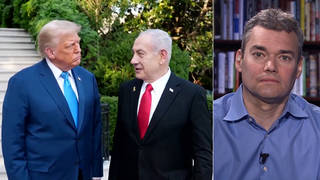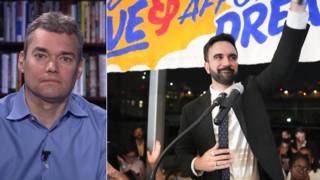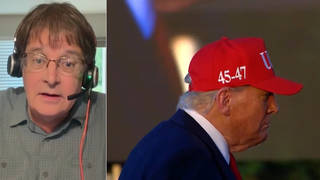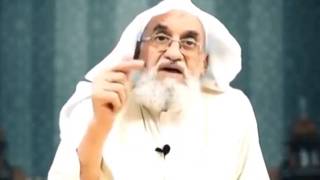
Topics
Guests
- Khalilah Sabrafriend of Jude Mohammad, the fourth American confirmed killed by a U.S. drone strike since 2009. She is the director of the Muslim American Society Immigrant Justice Center.
U.S. Attorney General Eric Holder sent a letter to Congress on Wednesday that admitted for the first time that the Obama administration has killed four U.S. citizens in drone strikes overseas. Today we learn more about one of them: Jude Kenan Mohammad. Until this week, the FBI had Mohammad listed on its Most Wanted website, even though he was secretly killed by the United States in November 2011. Mohammad was born in Florida and grew up in Raleigh, North Carolina. Friends say he grew radicalized under the influence of a local man named Daniel Boyd, who had converted to Islam at a young age and was later charged as the ringleader of a group of men — including Mohammad — who were accused in 2009 of stockpiling weapons and plotting to carry out terrorist attacks overseas. His name next surfaced on the 10th anniversary of 9/11, when the FBI warned of an unconfirmed tip that al-Qaeda planned to set off a car bomb in New York City or Washington, D.C. About a month later, his wife called his mother from Pakistan to say he had been killed in a drone strike in Pakistan. We speak with Khalilah Sabra, director of the Muslim American Society Immigrant Justice Center, who knew Mohammad as a child and stayed in touch with him when he moved to Pakistan as a teenager after dropping out of high school.
Transcript
JUAN GONZÁLEZ: On Wednesday, Attorney General Eric Holder sent a letter to Congress that admitted for the first time that the Obama administration had killed four U.S. citizens in drone strikes overseas. Today we learn about one of those citizens, Jude Kenan Mohammad. Until this week, the FBI had Mohammad listed on its Most Wanted page, even though he was secretly killed by the United States in November 2011.
Well, Mohammad was born in Florida and grew up in Raleigh, North Carolina, with his mother and four sisters, after his parents divorced and his father returned to Pakistan. Friends say he grew up radicalized under the influence of a local man named Daniel Boyd, who had converted to Islam at a young age and was later charged as the ringleader of a group of men, including Mohammad, who were accused in the 2009 stockpiling of weapons and plotting to carry out terrorist attacks overseas.
AMY GOODMAN: When Boyd and the others were arrested on the allegations, Mohammad was no longer living in the United States. He had gone to Pakistan the year before, where he lived with his father. At one point he was briefly detained by Pakistani authorities for lacking the proper travel documents when he tried enter the tribal region along the Afghan border that’s an al-Qaeda and Taliban militant area.
The next time Jude Mohammad’s name surfaced was in the days ahead of the 10th anniversary of 9/11, when the FBI warned of an unconfirmed tip that al-Qaeda planned to set off a car bomb in New York City or D.C. The alleged terror plot was supposedly initiated by then-al-Qaeda chief Ayman al-Zawahiri, Osama bin Laden’s successor, who had pledged to avenge bin Laden’s death. The FBI said three other so-called al-Qaeda leaders could be involved. They included 22-year-old Jude Kenan Mohammad. This is how ABC News’ Brian Ross reported it in September of 2011.
BRIAN ROSS: ABC News has in fact learned new details of the source of this troubling information. My colleague Martha Raddatz reports the source overseas is well known and trusted by U.S. officials, but that in this case his information about the vehicle bomb plot may be, at best, secondhand. Even so, officials say at this point they have no choice but to act as if the threat is real and that the clock is ticking.
It was only 48 hours ago, on Wednesday in Pakistan, that officials say the CIA developed the information. Three men, including at least one American citizen, had traveled to the U.S. in mid-August from Pakistan through Dubai, assigned to attack New York or Washington with a vehicle bomb on September 10th, 11th or 12th. Officials call the source credible; the information, very specific but still unconfirmed.
RICHARD CLARKE: “It’s uncorroborated” means there’s only the one source. None of our other sources are saying the same thing. And, so far, we haven’t been able to actually find any evidence in the real world that the report is true.
AMY GOODMAN: That last voice in that Brian Ross ABC News report was Richard Clarke, former national coordinator for security counterterrorism under the George W. Bush administration.
Well, about a month after the FBI said Jude Mohammad was linked to the alleged terror plot, his wife called his mother from Pakistan and said he had been killed in a drone strike in Pakistan. His family was unable to confirm his death with U.S. officials. This is how North Carolina TV news station WRAL reported it months later.
DAVID CRABTREE: Jude Kenan Mohammad went to high school here, then disappeared in a dangerous part of Pakistan known for breeding terror. In this WRAL investigation, Kelcey Carlson found the question is not only where is Jude Kenan Mohammad, but whether or not he’s dead or alive.
KELCEY CARLSON: In November, they heard Jude Mohammad was killed in a drone strike, news that was delivered by his pregnant wife in Pakistan to his mother back here in the Triangle. The U.S. government has not confirmed his death. But the people who knew him here believe it’s probably true.
UNIDENTIFIED: No one has heard from him since then.
JUAN GONZÁLEZ: Well, to learn more about Jude Mohammad, we go to Raleigh, North Carolina, where he grew up, to speak with Khalilah Sabra. She knew Mohammad as a child and stayed in touch with him when he moved to Pakistan as a teenager after dropping out of high school. She’s still close with his mother. Khalilah Sabra is also director of the Muslim American Society Immigrant Justice Center.
Welcome to Democracy Now!
KHALILAH SABRA: Thank you for having me.
JUAN GONZÁLEZ: Could you tell us something about—about Jude Mohammad in his early years and the times that you knew him?
KHALILAH SABRA: Jude was an all-American boy, with the exception of the fact that he was what we call the other victim of 9/11. Jude grew up in a climate of Islamophobia, religious profiling, and it made it very difficult for him to stay here or to find any basis for trust of the American government. In the end, he decided that he would leave this country.
AMY GOODMAN: What is the reaction—what is your reaction, Khalilah, as well as the reaction of his family, of his mother, who lives in North Carolina, to this news of a day ago that the Obama administration now admits that they killed Jude Mohammad in a drone strike?
KHALILAH SABRA: It’s more than just a little bit too late. The government had an obligation to inform his mother that he had been killed. And especially, they should—they have a responsibility to tell her why he was killed. Jude Mohammad was not a senior leader of al-Qaeda. Despite the reasons he went there, there are no indications, no evidence that have been shown to us, that he rose above the level than someone in transition that went to Pakistan. Where is the evidence that links him to al-Qaeda? And who made the decision to target him for death? None of those questions have been answered. And it’s wrong. And I think that the community in Raleigh, as well as his parents, deserve an answer to those questions.
JUAN GONZÁLEZ: Now, for his mother now, these two years since they first got word that he might be dead and now this official word, how has she been able to deal with this uncertainty, not knowing for sure what had happened to him?
KHALILAH SABRA: I think that she accepted the fact that he was dead a long time ago, but in the absence of confirmation, it’s perfectly normal to have a little bit of hope that somehow he might be alive. If the government purposely withheld this information, then they did her a great disservice. And she has suffered behind the fact that his death has not been acknowledged. She loved her son. This was her son. And she deserved to know what happened to him.
AMY GOODMAN: Khalilah Sabra, can you tell us what you understand did happen? How was he killed in this drone attack that the U.S. government is admitting this week, despite the fact that even after the Attorney General Eric Holder’s letter came out saying, yes, they killed Jude Mohammad, that his face and name was up on the FBI Most Wanted list?
KHALILAH SABRA: First of all, the fact he was on the FBI’s Most Wanted list doesn’t mean that he’s received due process and that he’s been convicted of anything. I think that, like I said, they had an obligation to say why he was there, who he was with, why he was—from what we know, he was with a group of people, and a drone was dropped on top of them. Why he came to be targeted or allowed to be killed with this group of people is still unknown to us.
JUAN GONZÁLEZ: What about this group that he was accused of being a co-conspirator with, the David Boyd group? Could you talk about that case and its impact in your city?
KHALILAH SABRA: Daniel Boyd was convicted along with a group of youths for conspiring to commit acts of terrorism. Jude, I think, was—should be considered a separate entity. First of all, when he was indicted, he wasn’t here. He had been gone for a very long time. We don’t know exactly what the allegations are against him. And the fact that he hasn’t been convicted of anything says a lot about his rights. Now, just because—the other ones were convicted. Daniel Boyd took a plea deal and basically threw the other ones under the bus. But, you know, there’s still a lot of unanswered questions about what was the role of Jude Mohammad in that entire situation.
AMY GOODMAN: Did you ever see any evidence against Jude Mohammad?
KHALILAH SABRA: No, no. And his—
AMY GOODMAN: Can you talk about Jude Mohammad’s wife? She was pregnant when he was killed?
KHALILAH SABRA: All I know about his wife is that she was pregnant when he was killed. She called his mother, and she gave her the news that her son had in fact died in a drone attack. So the fact he was killed by a drone is not unknown to his parents and to the community. I mean, that was established or known by the community a long time ago. Or—but without confirmation, he couldn’t even receive what is the customary funeral prayer, without confirmation of that. And that had an effect on his mother, too.
JUAN GONZÁLEZ: You mentioned—you mentioned earlier the impact of Islamophobia on Jude Mohammad. Could you talk about, in Charlotte, the atmosphere post-9/11 that the Muslim community confronted?
KHALILAH SABRA: The atmosphere was rough, like it was rough all over America. You had people being detained. You had people being arrested on immigration violations that had no criminal history. You had profiling. You had extensive investigation of people with Muslim last names, Muslim first names. You had students being harassed and bullied in school. We hear about a lot these days about students being bullied in school, but to have the experience of being a Muslim and being bullied in school for geopolitical reasons is something else. It was very difficult, especially for that generation, the kids that grew up with Jude, to be able to deal with and have that and feel—and not be protected in the educational institutions across America. That’s a crime in itself.
AMY GOODMAN: Khalilah Sabra, I want to thank you very much for being with us, knew Jude Kenan Mohammad, one of the four Americans the U.S. government has admitted killing in drone strikes. Al-Awlaki and his son were also named, as well as Samir Khan, who was in Charlotte, North Carolina.
That does it for our show. If you want to see our discussion with Noam Chomsky and Jeremy Scahill around Dirty Wars, you can go to our website at democracynow.org.













Media Options